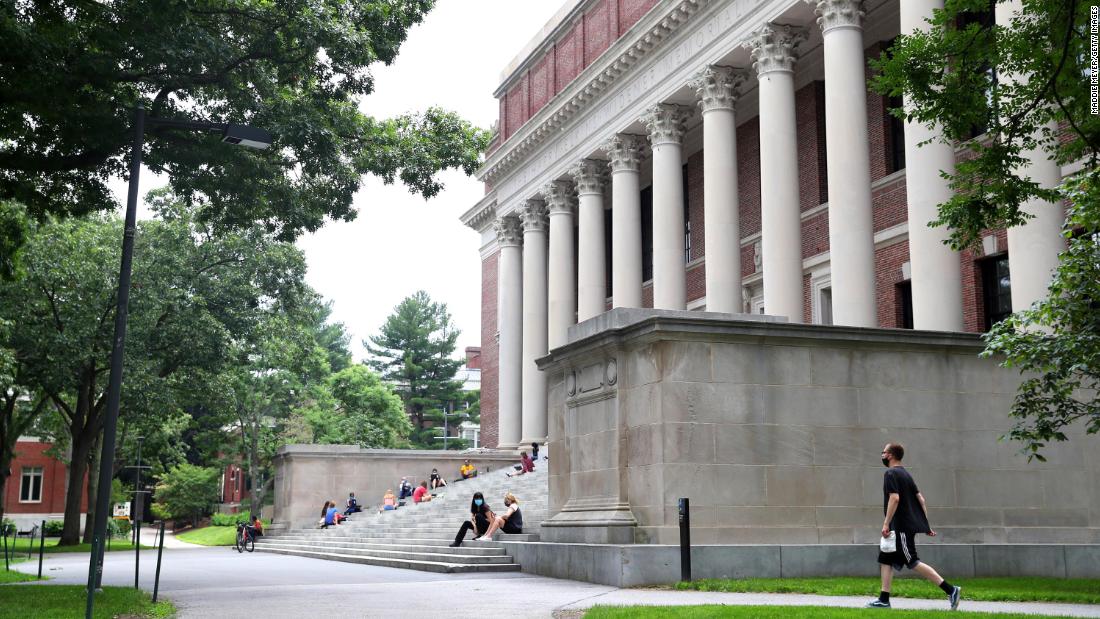
A student born in Iran who is a British citizen, for example, could still get only a two-year visa, meaning that they would have to reapply to complete a four-year degree in the United States.
Numerous American universities have strongly criticized the plan, with many leaders noting that institutions of higher education have already suffered from Donald Trump's anti-immigration policies. These institutions, unfortunately, are not alone. Trump's approach has also undercut the United States economically and strategically, ultimately undermining Washington's attempts to fend off an illiberal and what many have called an increasingly assertive China's attempts to seize global leadership.
Since Trump took office, the number of international students enrolled in the United States has dropped precipitously. In recent months, some students abandoned plans to study here because of Trump's Covid-19-related immigration restrictions; others reconsidered their plans because of our inability to get the virus under control. One Vietnamese student studying in California put it simply: "The United States is no longer a safe place."
And while visa overstays are broadly a problem, DHS's new plan to address them is so heavy-handed that it promises to diminish both the number of international students in the United States and America's reputation, which Trump has already damaged greatly.
Indeed, this potential restriction, along with others that the Trump administration floated over the summer, reinforces the notion that the US is hostile to foreigners and that international students would be better off pursuing opportunities in the United Kingdom, Canada, or even China.
But without international students, universities will lose millions in revenue, the US economy will lose billions, and the United States will be deprived of the significant contributions that foreign students make in many fields.
Losing international students, or even proposing barriers to keep them out, is also disastrous from a strategic perspective.
By welcoming international students -- over 1 million in 2019 -- the United States advances its soft power abroad. Students come to the United States, generally view the country positively, and then take their approval back home.
These students are also prone to advance American interests, if given the chance. The number of other international leaders who studied in and were later geopolitically friendly to the United States is many, including Jordan's King Abdullah and Singapore's Lee Hsien Loong, as well as the leaders of Cote d'Ivoire, Ethiopia, Ghana, Kenya, and Somalia -- some of our closest African partners.
Opening our doors to the world's best and brightest clearly serves American interests. The Department of State once seemed aware of this, maintaining a web page titled "foreign students yesterday, world leaders today." That page has since been removed.
Trump is so blinded by xenophobia that he cannot see the benefits international students offer. Instead, his "America First" administration at best considers them leeches on the American system, and, at worst, deems them nefarious spies to be kept out of fortress America.
This hostile approach undermines American efforts to fend off China's growing influence in the developing world. While Secretary of State Mike Pompeo rails righteously against the authoritarian Chinese Communist Party, his boss pushes forward with moves that undermine America's global standing and prompt more countries to look towards China: alienating allies, demanding deference from partners, imposing travel bans on friendly countries, and now, potentially imposing visa restrictions on foreign students.
Trump administration officials bizarrely think that they can convince the developing world to join some anti-China coalition while denigrating them, picking fights with their leaders, and targeting their students. Washington's hard line on Beijing may be welcome in certain countries, but it is not enough to win them over or repair the damage Trump has done to the United States' reputation. It is certainly not enough to convince them to refute Chinese offers: China has already become the top destination for English-speaking African students and is both Africa's largest trading partner and creditor.
Trump's approach is irrational, to say the least. His expectation that developing countries will defer to the United States, rather than bristle at our unfriendliness when comes to issues like international students, makes little sense in a world where China presents itself as a benevolent alternative flush with cash.
Trumpism is incompatible with US global leadership; paradoxically, though, it meshes well with China's hopes to seize that mantle and construct a new world order free from Western influence and values.
Trumpism too often inflicts too much damage on the United States to serve Americans' best interests.
The US would be better served by leaders who recognize the need to welcome and cultivate the world's talent -- both for their benefit and America's.
"Opinion" - Google News
October 20, 2020 at 12:15AM
https://ift.tt/34c911t
By limiting student visas, the US is losing more than students - CNN
"Opinion" - Google News
https://ift.tt/2FkSo6m
Shoes Man Tutorial
Pos News Update
Meme Update
Korean Entertainment News
Japan News Update
No comments:
Post a Comment